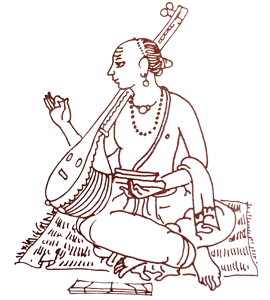Download Venkata Kavi app
Life

Birth and early life: As per available information (from the Family Tree) Oottukkadu Venkat Kavi was born to Subbu Kutti Iyer and Venkamma in Mannargudi, a temple town near Tanjavur in South India, sometime in early 1700s. Later on, they are said to have migrated to Oottukkadu, which was a small neighbouring village. Venkata Kavi lived in a very pious and culturally alive atmosphere. He had remained a celibate and lived a very introspective life meditating upon God and music. The fact that he had traveled widely can be deduced from a variety of his compositions composed on the deities of many temple-towns in South India and neighbouring northern states.
Divine influence: In his young days, Venkata Kavi expressed an interest to learn music from Shri Krishna Yogi. However, upon Krishna Yogi's refusal to teach him, his mother advised a dejected Venkata Kavi to surrender himself to Lord Krshna in the Kalinga Narttana temple at Oottukkadu. It is believed that the Lord himself appeared before Venkata Kavi and blessed him with knowledge.
Therefore, it is not surprising to find that Venkata Kavi refers to Lord Krshna as his 'divine preceptor' in many compositions. But some compositions also seem to suggest that he may have had a human pedagogue too. Currently, around 500 plus compositions of this great composer have been discovered from various sources. Over 300 of these have been published by noted harikatha exponent, Needamangalam Krishnamurthy Bhagavatar (who was a descendant of the poet's brother's family), who was hugely instrumental in propogating and popularizing Venkata Kavi's works.
Other influences and sources of inspiration: One of the most obvious factors that have made Venkata Kavi's compositions among the greatest in Indian culture are the imprint of great personalities right from Valmiki, Vyasa, Jayadeva, Arunagirinathar and many others on him. His compositions are a testimony to the fact that he had been deeply impacted by the lives, knowledge and exemplary attitude of numerous great devotees including the 12 azhwars, 63 nayanmars and composers such as Purandara Dasa and Tulasi Dasa.
Another powerful influence was the Bhagavata mela tradition that flourished in South India during the Maratha rule. The Marathas ruled the Tanjore region between the 17th and 19th centuries during which Oottukkadu, along with Melattur, Shoolamangalam and Shalyamangalam became major centres for the Bhagavata mela tradition to flourish. This strong influence seems to have inspired Venkata Kavi to compose many operas on various great personalities, the Ramayana, Mahabharata and Bhagavatam. The Bhagavata mela influence also explains his mastery over diverse musical forms suited for music, dance and theatre and the handful of pieces in Marathi !




